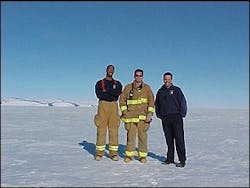Firefighter Discovers Work, Adventure Worldwide
Add to that lifestyle, elements of danger and adventure in exotic locations and it would seem that the risks associated with the job multiplied exponentially. Surprisingly however, the interest amongst U.S. firefighters, EMT first responders, and police officers to use their skills overseas has grown tremendously in recent years.
According to Jeremy Weible, 30, of Olympia, WA, a Texas and Washington State trained EMT firefighter and paramedic who has lived and worked overseas as a first responder since 1999, the primary motivation for many of his U.S. colleagues is simple, but powerful.
"Imagine being able to live on a tropical paradise in the middle of the Pacific, with Hawaii-like weather, dolphins, coral reefs, and you're being paid $28,000 to $36,000 tax free," Weible said. "You stay for one year and you get to keep all the money!"
However, not every overseas job is as rewarding as Weible makes it sound, and he should know. Over the past five years he has traveled to the end of the world and back, visiting numerous exotic locals as a tourist while also achieving the indubitable feat of having worked as a first responder on all seven continents.
And not every job has been about breath-taking scenery and beautiful weather.
"When you go to a war zone it's dusty, you get shot at -- rockets coming in all the time -- no alcohol, no social life, and you go to the bathroom in a Porta-Potty and live in a tent for a year," Weible said. "Still, firefighters or paramedics are paid $80,000 to $120,000 a year for these positions, tax free, in your pocket."
Despite the demand and pay for first responder work being very high for skilled U.S. citizens, if you're not affiliated with the U.S. military or a humanitarian aid organization then you're going to have to seek out hard-to-find, competitive, contract based positions.
According to Weible, finding overseas contract work is easy if you know where to look online. Companies such as Halliburton and Raytheon have career pages within their websites that are rich resources, and dedicated firefighter news and resource sites such as Firehouse.Com have extensive jobs sections which often feature a variety of overseas positions.
"Finding the work in the first place is the simple part. It just amounts to hours and hours of searching and searching on the internet. Once you find what you're looking for, build contacts and never burn any bridges," Weible said.
However, Weible warns that interested candidates should be aware that just signing up for these positions can mean your reputation and career as a first-responder are being put on the line.
"Once you commit to a contract, see it out. If you pull out or change your mind at the last minute your name is black flagged which can have serious consequences," Weible said. "I've seen good firefighters become exiled from their line of work because they went on vacation mid-contract and never came back or left a recruiter hanging. Don
